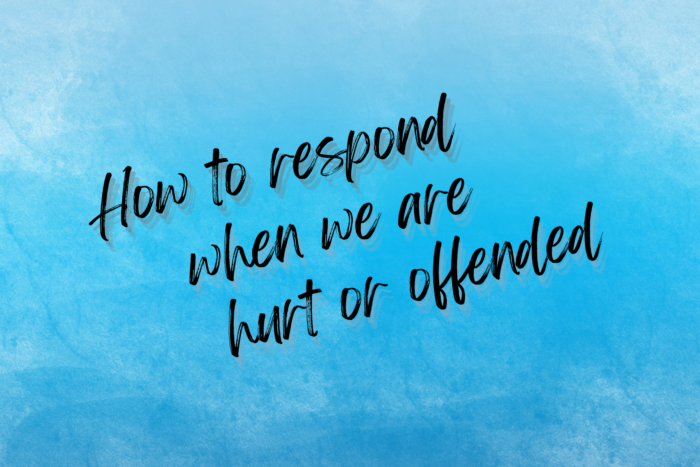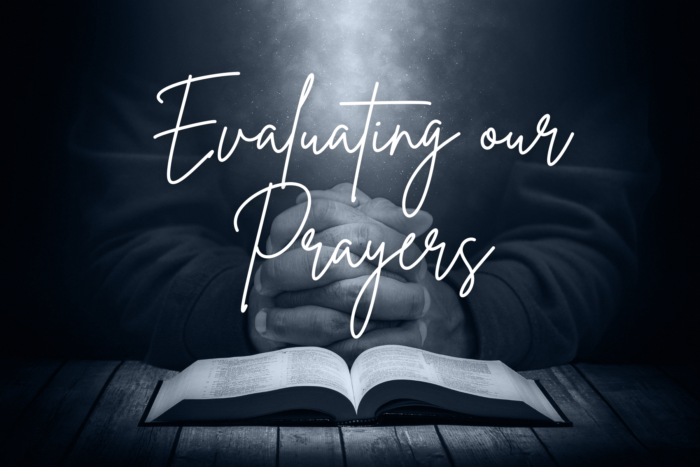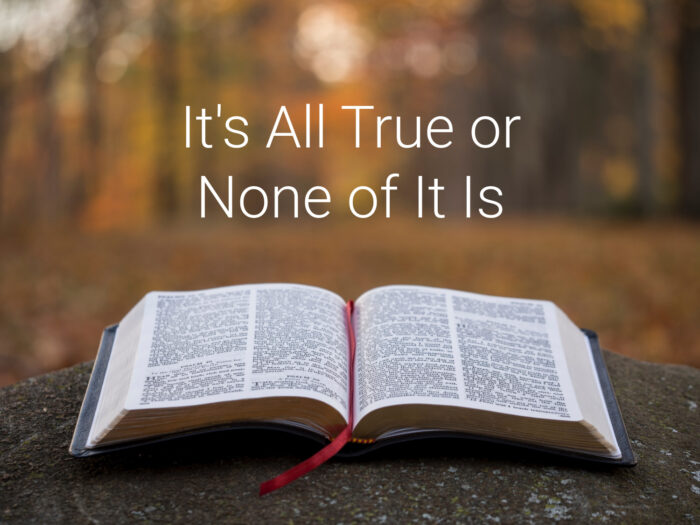How to Respond When We are Hurt or Offended
As we walk in this world as a believer who is committed to Jesus Christ and desires to follow Him, no matter the cost, we will inevitably be persecuted at some level. Jesus Himself said that we will be hated because the world hates Him (John 15:18-19). John reminded us of this same truth in I John 3:13: Do not be surprised if the world hates you and I Peter 2 tells us to rejoice if we suffer unjustly.
But sometimes our suffering isn’t for any good reason. Instead, it is our pride that demands revenge or keeps our heart from forgiving another person. We cry out for revenge because our pride desires it in order to be satisfied. (That ugly pride gets us into so much trouble!!!)
A few years back a friend gifted me a book called “Keeping the Heart” by John Flavel. The book itself (which I highly recommend and can be found at this link) has been changed into English that is easier to understand. It is very profound and has caused me much deep reflection.
When I read the portion that I am sharing today, I had the thought that I have not written much about these topics of revenge, vengeance, and grudge-holding. And, yet, they affect the world we live in in a profound (and quite evil) way. Even in our churches. While those who profess Christ may not exert revenge, they may surely long for it. While they may pretend that all is well, inside so many are nursing a grudge or some offense towards a Christian sibling.
I have seen this over and over again and have also experienced it. For example, years ago, I thought all was well with a woman at church. Only to find out, through her off-handed comment to a family member, that she held a longtime grudge against me for a thoughtless remark I had made. I can still remember the helplessness I felt at that moment. I hadn’t even been aware she was upset with me and I certainly had never meant what she thought I meant. It taught me to be so much more careful with my words (still learning that lesson!) and it also reminded me of how unhealthy these grudges are that Christians so often hold on to! They truly destroy families and church families.
With that in mind, I’d like to share a long portion from this book, Keeping of the Heart. I found the original manuscript in pdf form so I did copy and paste. You can find that original manuscript here. (Although I do recommend the book as it is much easier to read.) I have taken the liberty to change a few words to make it more readable. You will find those changed words in italics. I have also removed a few extra paragraphs to also increase its readability and to decrease its length.
I hope this will be a reference for you when you feel the urge to nurse a grudge or something happens to you (whether deserved or undeserved) and you feel the desire for revenge rise inside you. Flavel’s words here are most compelling and helpful. At least they were for me. I hope they are for you, too. Here’s what Flavel writes–
The seventh season calling for more than common diligence to keep the heart, is, when we receive injuries and abuses from men. Such is the depravedness and corruption of man in his collapsed state, that one man is become as a wolf or a tiger, to another. As wicked men are cruel and oppressive one to another, so they conspire together to abuse and wrong the people of God, as the same prophet complains.. “The wicked devoureth the man that is more righteous than he.” Now when we are thus abused and wronged, it is hard to keep the heart from revengeful motions: to make it meekly and quietly to commit the cause to him that judgeth righteously; to exercise no other affection but pity towards them that abuse us. Surely the spirit that is in us lusteth to revenge, but it must not be so; you have choice helps in the gospel to keep down your hearts from such sinful motions against your enemies, and to sweeten your embittered spirits.’ The seventh case then shall be this–
How a Christian may keep his heart from revengeful motions, under the greatest injuries and abuses from men. The Gospel, indeed, allows a liberty to vindicate our innocency, and assert our rights, but not to vent our corruptions, and invade God’s right. When therefore thou findest thy heart begin to be inflamed by revengeful motions, presently apply the following remedies—
Remedy 1. Urge upon thy heart the severe prohibitions of revenge by the law of God. Remember that this is forbidden fruit, how pleasant and luscious soever it be to our defiled appetites. O, saith nature, revenge is sweet: O but, saith God, the effects thereof shall be bitter. How plainly hath God commanded against this flesh-pleasing sin, Prov. 20:22. “Say not I will recompense evil.” Prov. 24:29. “Say not I will do so to him as he hath done to me.” Rom. 12:17. “Recompence to no man evil for evil.” And ver. 19. “Avenge not yourselves, but rather give place to wrath.” Nay, that is not all; but Prov. 25:21. “If thine enemy hunger, feed him; if he thirst, give him drink.” The word feed him, as critics observe, signifies to feed cheerfully, and tenderly, as birds do their young ones: The scripture is a great friend to the peace and tranquillity of human society, which can never be preserved if revenge be not deposed. It was wont to be an argument urged by the Christians to prove their religion to be supernatural and pure that forbids revenge, which is so sweet to nature; and verily it is a thousand pities such an argument should be lost. Well, then, awe your hearts with the authority of God in these scriptures, and when carnal reason saith, mine enemy deserves to be hated, let conscience reply, but doth God deserve to be disobeyed? Thus and thus hath he done, and so he hath wronged me; but what hath God done that I should wrong Him? If he dare be so bold to break the peace, shall I be so wicked to break the precept? If he fears not to wrong me, shall not I fear to wrong God? O let the fear of God’s threatenings repress such sinful motions.
Remedy 2. Set before your eyes the most eminent patterns of meekness and forgiveness, that your souls may fall in love with them.
This is the way to cut off those common pleas of the flesh for revenge: As thus no man would bear such an affront: Yes, such and
such have borne as bad and worse. I shall be reckoned a coward, a fool, if I pass by this: No matter, as long as I follow the examples of the wisest and holiest of men; never did any suffer more and greater abuses from men than Christ did, and never did any carry it more peaceably and forgivingly, Isa. 53:7. “He was oppressed, and He was afflicted, yet He opened not His mouth: He was brought as a lamb to the slaughter,” This pattern of our Lord the apostle sets before you for your imitation, 1 Pet. 2:21, 22, 23. “For even hereunto are you called, because Christ also suffered for us, leaving us an example that we should follow His steps: Who when He was reviled, reviled not again; when He suffered, He threatened not, but committed Himself to Him that judgeth righteously.” To be of a meek, forgiving spirit, is Christ-like, God-like; “then shall you be the children of your Father which is in heaven; for He maketh His sun to rise upon the evil and upon the good, and sendeth rain on the just and unjust,” Matt. 5:45. How eminently also did the Spirit of Christ rest upon His apostles? Never were there such men upon earth for true excellency of spirit. None were ever abused more, or suffered their abuses better. “Being reviled (say they) we bless; being persecuted, we suffer it; being defamed, we entreat,” 1 Cor. 4:12, 13. Strive then for this excellency of spirit, which is the proper excellency of Christians; do some singular thing that others cannot do, and then you will have a testimony in their consciences.
Remedy 3. Consider well the quality of the person that hath wronged thee: either he is a redeemed man, or a wicked man, that hath done thee the injury: If he be a redeemed man, there is light and tenderness in his conscience, and that will bring him at last to a sense of the evil he hath done; however, Christ hath forgiven him greater injuries than these, and why shouldst not thou? Will Christ not upbraid him with any of those wrongs done to him, but frankly forgive them all; and wilt thou take him by the throat for some petty abuse that he hath done to thee? Or is he a wicked man? If so, truly you have more need to exercise pity, than revenge towards him, and that upon a double account: For, (1.) He is beside himself, so indeed is every unconverted sinner, Luke 15:17. Should you go into Bedlam, and there hear one rail at you, another mock you, and a third threaten you; would you say I will be revenged upon them? No, you would rather go away pitying them! Alas, poor creatures! they are out of their wits, and know not what they do. Besides, (2.) There is a day coming, if they repent not, when they will have more misery than you can find in your hearts to wish them; you need not study to revenge, God’s vengeance sleepeth not, and will shortly take place upon them, and is not that enough? Have they not an eternity of misery coming? If they repent not, this must be the portion of their cup; and if ever they do repent, they will be ready to make you reparation.
Remedy 4. Keep down thy heart by this consideration, that by revenge thou canst but satisfy a lust, but by forgiveness thou shalt
conquer a lust. Suppose by revenge thou shouldst destroy one enemy, I will shew thee how, by forgiving, thou shalt conquer three, thine own lust, the devil’s temptation, and thine enemy’s heart; and is not this a more glorious conquest? If by revenge thou overcome thine enemy, yet unhappy victory, when, by overcoming another man, thou art overcome by thine own corruption. But this way you may obtain a glorious conquest indeed. It must be a very disingenuous nature indeed, upon which meekness and forgiveness will not work; a stony heart, which this fire will not melt. To this sense is that, Prov. 25:21. “If thine enemy hunger, feed him; if he thirst, give him drink; for in so doing thou shalt heap coals of fire upon his head.” Some will have it a sin-punishing fire, but others a heart-melting fire. To be sure it will either melt his heart, or aggravate his misery.
Remedy 5. Seriously ask this question to thy heart: Have I got any good by the wrongs and injuries received, or have I not? If they have done you no good, turn the revenge upon yourselves: O that I should have such a bad heart, that can get no good out of such troubles! O that my spirit should be so unlike to Christ’s! The patience and meekness of other Christians, have turned all the injuries thrown at them into precious stones; the spirits of others have been raised in blessing God, when they have been loaded with reproaches from the world, they have bound them as an ornament to their necks. Luther has said: I could even be proud upon it, that I have a bad name among wicked men. To the same purpose Jerome said sweetly: I thank my God that I am worthy to be hated of the world. Thus their hearts were provoked by injuries to magnify God, and bless him for them; if it work contrary with me, I have cause enough to be filled with self-disgruntlement. If you have got any good by them; if the reproaches and wrongs you have received, have made you search your hearts the more, watch your ways the more narrowly; if their wronging you, has made you see how you have wronged God, then let me say for them, as Paul did himself, Pray forgive them this wrong. What! can you not find a heart to forgive one that hath been instrumental of so much good to you! That is strange! What though they meant it for evil? Yet, if God hath turned it to good, you have no more reason to rage against the instrument than he had who received a wound from his enemy which which healed the abscess which otherwise had been his death.
Remedy 6. It is of excellent use to keep the heart from revenge, to look up, and eye the first cause by which all our troubles are ordered. This will calm and meeken our spirits quickly. “The Lord hath taken away, blessed be his name,” Job 1:21.
Objection: But you will say, To turn aside the right of a man, to subvert a man in his cause, the Lord approveth not, Lam. 3:36. Answer: True: but though it fall not under His approving, yet it doth under His permitting will, and there is a great argument for quiet
submission in that; nay, He hath not only the permitting, but the ordering of all those troubles. Did we see more of an holy God, we
should shew less of a corrupt nature in such trials.
Remedy 7. Consider how you daily wrong God, and you will not be so easily inflamed with revenge against others that have wronged you. You are daily grieving, and wronging God, and yet He bears, forgives, and will not take vengeance upon you; and will you be so quick in avenging yourselves upon others? O what a sharp and terrible rebuke is that! Mat. 18:32, 33. “O thou wicked and slothful servant! I forgave thee all that debt because thou desirest me, shouldst not thou also have had compassion on thy fellow servant, even as I had pity on thee?” None should be so filled with pity, forbearance, and mercy, to such as wrong them, as those should be that have experienced the riches of mercy themselves: The mercy of God to us should melt our very hearts into mercy over others; it is impossible we can be cruel to others, except we forget how kind Christ hath been to us. Those that have found mercy, should shew mercy. If kindness cannot work, fear should. “If you forgive not men their trespasses, neither will your Father forgive you your trespasses,” Mat. 6:15.
Remedy 8. Lastly, Let the consideration of the day of the Lord, which draweth nigh, withhold your hands from anticipating it by acts of revenge. Why are you so quick? Is not the Lord at hand, to avenge all His abused servants? “Be patient therefore, my brethren, unto the coming of the Lord. Behold the husbandman waits. Be ye also patient, for the coming of the Lord draws nigh: Grudge not one against another, brethren, lest ye be condemned. Behold the Judge standeth at the door,” Jam. 5:7, 8, 9. This text affords three arguments against revenge: (1.) The Lord’s near approach. (2.) The example of the husbandman’s patience. (3.) The danger we draw upon ourselves by anticipating God’s judgment; Vengeance is mine, saith the Lord; he will distribute justice more equally, and
impartially, than you can. They who believe they have a God to right them, will not so much wrong themselves, as avenge their own
wrongs.
Objection 1: But flesh and blood are not able to bear such abuses.
Solution: If you resolve to consult flesh and blood in such cases, and do no more but what that will enable you to do; never pretend to even be saved. Christians must do singular and supernatural things.
Objection 2: But if I put up such abuses, I shall be reckoned a fool, and every one will trample upon me.
Solution: (1) You may be reckoned so among fools, but God and good men will account it your wisdom, and the excellency of your spirits. (2.) It must be a base spirit indeed that will trample upon a meek and forgiving Christian: and thus learn to keep your hearts from revenge under all provocations.










